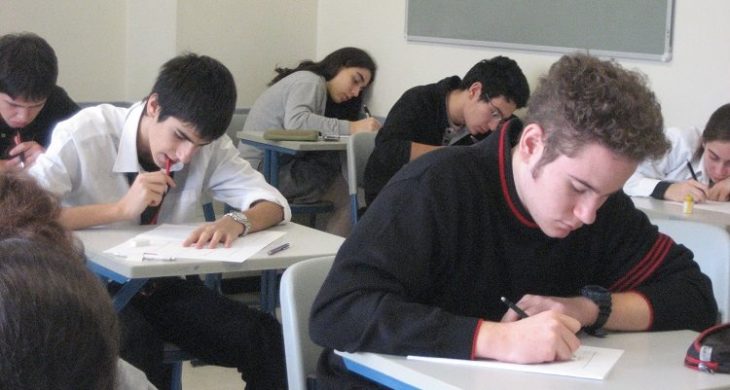Current Curriculum Seem More Designed to Produce Test-Takers Than Life-Long Learners
Students constantly poke fun at school curriculum, claiming that it is a jumble of jargon that in no way prepares anyone for adulthood. After spending thirteen years following the motions to move up grade by grade, the hope would be that by the time students reach college, preliminary schooling would have set students up to function in the real world as independent individuals. Through the students’ point of view, this is goal has been entirely missed, but they still may think there must be some rhyme or reason behind the strategic creation of school curriculum.
As stated by the Glossary of Education Reform, school curriculum encompasses the lessons and academic content taught in schools. This also includes the learning standards or learning objectives that students are expected to meet.
While students today may prove able to reach the learning goals established within the current sets of curriculum, those standards are not necessarily as productive as they should be; therefore, they may not be supporting students with the knowledge needed to succeed as adults in the real world.
With the third largest public school system in the nation, Florida schools are trusted with the responsibility of properly educating over 2,800,000 students. Having such a high enrollment rate may be trouble enough to prevent school curriculum from truly being as effective as possible.
The Florida Education Finance Program granted just over a $20 billion operating budget across all public schools in the 2017-2018 school year, averaging around $7,100 per student. While this may seem like a decent amount of money to be invested in a single student, this number ranks 41st amongst the 50 states in terms of per pupil expenditures. Such a low standing is an indicator as to why Florida’s students may not be receiving the most out of their education. Even if the curriculum is written to best educate the students, if limited funding exists, it is seemingly impossible to carry out every element to the fullest potential.
TED-Ed speaker Adora Svitak brings up the valid point that teachers very rarely try to connect required concepts like Shakespeare and Calculus to the real world. Rather than spewing fact after fact for students to memorize in the short term, teachers can help students form real-world connections that can allow for the topics to be utilized in more than just the classroom. Any student can relate to that one moment where the confusion level in the room is astronomical, but suddenly the teacher relates this seemingly abstract concept to something extremely simple and imaginable, such as video games or social media, and all of a sudden, everything clicks.
If only all teachers could incorporate true scenarios into their lessons, students could gain such greater knowledge than just simple memorization of facts. Algebra, biology, psychology, chemistry– all of these subjects could prove beneficial past the high school level, but the connection from the textbook to the world needs to be made.
Dr Ivette Urbina, Olympic Heights Guidance Department Chairperson, shares that this idea of creating scenarios that exist in the real world as the basis of a teacher’s lesson is a “two way” discussion. While on one hand, it can help students grasp what they are learning and why in areas such as physics or engineering. However, on the other side of the issue, bringing in complex versions of problems instead of straightforward examples will make learning “long and complicated.”
Another major issue that is only growing within the public school system is the mindset of “teaching to the test.” As college acceptances become more and more competitive, students begin taking higher level classes much earlier and in much higher frequency, prompting teachers of many classes to gear lessons towards what is expected to appear on standardized tests.
After finishing a course and seeing what they were tested on at the very end, students often reach the same consensus that they only learned what teachers believed would appear on the final exams and not the most important information that should have been taken from such a course. While it is an important goal to help the students pass the exams that the students came into the class knowing they would have to take, it is even more crucial to give those students a full education on the subject and to teach more than what may be written as a multiple choice question.
The Florida Standards Assessments (FSA) begins evaluating student’s academic achievements from third grade, continuing all the way through mandatory high school courses. At just eight or nine years old, kids are being thrown irrelevant facts and strategies in order to get them to earn high scores on these standardized assessments. The better the student does, the better for the school as it earns more money from the state. With an incentive such as this, traditional knowledge that may actually be helpful in creating successful adults is replaced with endless facts concerning the periodic table and the area formulas for every imaginable shape.
Urbina expresses the unsettling nature of such a form of intelligence testing at such a young age and at such a high importance, admitting that as an experienced counselor, she “does not see the value of standardized testing” to the level that other institutions understand it. While it is important to have proper test taking skills, this should be coupled with more real life skills being developed, such as “following rules and listening to authority.”
Along with standardized testing, high school students are facing the grueling demand of having to earn more and more college credits from the minute high school begins. With this in mind, students are taking countless college level classes, including AP, AICE, and Dual Enrollment courses. These classes do prompt higher-level students to take more difficult classes to pursue their knowledge further, however the structure of these classes is designed to prepare students to pass one single test at the end of the school year. Teachers are expected to cover everything that may appear on the test, often throwing out information that may seem important to the teacher. Rather than learning overall concepts, students are forced to memorize minuscule facts just in case they show up on the test.
Overall, every student, teacher, or counselor has their own individualized opinion as to how schools should operate and what the proper techniques are to fully educate students. There are numerous unfortunate elements that seem to hinder students’ learning ability, and there are also many ways in which teachers can alter their style in the classroom to allow for more comprehension. Despite any setbacks, the main goal in any school and classroom should be to educate students and prepare them for whatever comes next to their highest potential.











